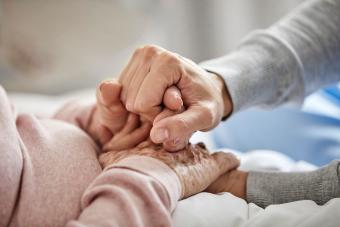

Were you diagnosed with pulmonary hypertension? Is your head spinning? Since you are an elderly woman, you might be wondering if this diagnosis is any different for you. Learn about what the prognosis of pulmonary hypertension means for a senior woman and treatment options.
What Is Pulmonary Hypertension?
Pulmonary hypertension, commonly referred to as PH, is very high blood pressure in the arteries of the lungs, called the pulmonary arteries. It is a progressive disease that currently has no cure. Many people do not realize that the pressure in the lungs has nothing to do with a person's overall regular systemic blood pressure.
Abnormally-high arterial blood pressure causes the right side of a heart to work much harder than it should as it tries to force the blood through arteries that gradually thicken under the strain of the disease. As the disease worsens, the heart cannot pump enough blood through the constricted arteries. Since there is not enough blood circulating through the lungs to pick up the oxygen needed to supply the body, shortness of breath, dizziness and extreme tiredness occur.
As the disease progresses, patients experience:
- Chest pain (angina pectoris)
- Breathlessness with any amount of exertion and eventually even without exertion
- Swollen legs and/or ankles (edema)
- Debilitating fatigue and loss of energy
- Dizziness when standing up, straightening up from a bent position, climbing stairs or just sitting
- Fainting (syncope)
- Dry cough
- Depression
- Raynaud's phenomenon (a bluish or white painful coloration of the fingers)
- Irregular heartbeat
- Very rapid heartbeat
As the heart continues to work very hard in order to compensate, it causes the heart wall to thicken and the disease often leads to heart failure.
Prognosis for Pulmonary Hypertension in Elderly Women
The prognosis for elderly women diagnosed with pulmonary hypertension depends on different factors. This is the same prognosis as for any person, regardless of the sex or the age of the person who is diagnosed with this disease.
The Severity of the Disease When Diagnosed
One of the key factors affecting the prognosis of pulmonary hypertension is the stage of the disease when it is diagnosed. All too often pulmonary hypertension is not recognized in the earlier stages and it is not diagnosed until it has progressed to an advanced stage. When this occurs, and the patient has not received medications to try too slow the progression of the illness, life expectancy is often two to three years. However, progress is being made in pulmonary hypertension research regarding medical treatments.
Medications such as calcium channel blockers and epoprostenol have been effective in slowing the rate of the disease's progression in many cases. Each year more and more people diagnosed with pulmonary hypertension are living longer with the disease, with some celebrating their ten, fifteen and even twenty years of life after diagnosis.
Overall Medical Condition of the Patient
Another key factor affecting the prognosis of a pulmonary hypertension patient is their overall health when they are diagnosed. When an elderly woman is diagnosed with the disease, she may also have other medical conditions which compromise her health. Any underlying medical problems or conditions, especially those that affect the heart or lungs, play an important role in her prognosis.
Response to Medication
Another important factor affecting the prognosis for pulmonary hypertension in elderly women is how the patient responds to medical treatment. Only a small percentage of patients diagnosed with pulmonary hypertension have a positive response to medications such as calcium channel blockers.
Medications Used for Pulmonary Hypertension
There are several medications used for pulmonary hypertension including:
- Calcium channel blockers
- Diuretics
- Digoxin
- Oxygen
- Warafin
- Endothelin Receptor Antagonists
- Phosphodiesterase Inhibitors
- Prostacyclins
- Intravenous Treatment Options
- Subcutaneous Treatment Options
- Lung Transplantation
Pulmonary Hypertension Resources
Having a loved one diagnosed with pulmonary hypertension often leaves the family, caregivers and the patient herself confused with many unanswered questions. Three excellent resources offering information, guidance and support to pulmonary hypertension patients, their families and their caregivers are the Pulmonary Hypertension Association, PH Central and the pulmonary hypertension online support group from MD Junction. Pulmonary hypertension is a disease that can affect anyone at any age. Early diagnosis is imperative. If you or a loved one is experiencing any of the symptoms of the disease, make an appointment to see your medical practitioner as soon as possible.







